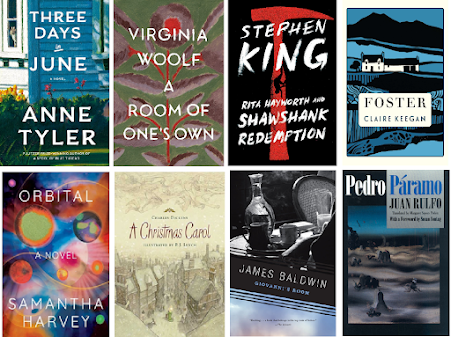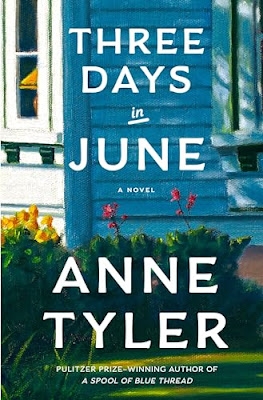Title: The Book of Lost Names by Kristin Harmel
Book Beginnings quote:
May 2005 -- It's a Saturday morning, and I'm midway though my shift at the Winter Park Public Library when I see it.
Friday56 quote:
She and her mother couldn't leave France without Tatus. He had wanted her to flee, but she couldn't, not if she had the means to free him.
Summary:
Eva Traube Abrams, a semi-retired librarian in Florida, is shelving books one morning when her eyes lock on a photograph in a magazine lying open nearby. She freezes; it’s an image of a book she hasn’t seen in sixty-five years—a book she recognizes as The Book of Lost Names.
As a graduate student in 1942, Eva was forced to flee Paris after the arrest of her father, a Polish Jew. Finding refuge in a small mountain town in the Free Zone, she begins forging identity documents for Jewish children fleeing to neutral Switzerland. But erasing people comes with a price. Eva decides she must find a way to preserve the real names of the children who are too young to remember who they really are. The records they keep in The Book of Lost Names will become even more vital when the resistance cell they work for is betrayed. (Publisher)
Review: It totally amazes me there are still fresh and new stories emerging out of the WWII/Holocaust. This story revolves around a woman, Eva, who goes into hiding with her mother, after her father is captured by the French police for being a Polish Jew. They escape to a small village in the Viche region of France where her artistic skills are put to work forging documents which allowed escorts to safely deliver Jewish children across the border into Switzerland. In order to not allow the children's real identity to completely disappear, Eva and another forger, Remy, develop a system using the Fibonacci sequence to hide the children's names in an old dusty book in the church's library. It is around this book author Kimel built her story after she heard a report of librarians in Berlin trying to untangle the mysteries of certain books which were taken by Nazis to Germany during raids at the end of the war.
I had a slow start with The Book of Lost Names. I had purchased the audiobook since the one at the library had a long queue and I needed to listen in a timely manner since the book is for this month's book club. My husband was with me when we started listening to the audiobook and both of us were appalled. He thought the writing was awful and couldn't endure listening to more than the hour I subjected him to. The next day, when I was listening to it alone, I realized it wasn't the writing but the narrator of the audiobook who was wrecking the experience. I couldn't bear to listen to another moment either. Fortunately I had a print copy of the book from the library kit so I could easily switch formats. That is a rarity. Usually my experience with audiobooks is very pleasant, sometimes even making it so I like a book better than others who read it for club. Not this time and now you've been warned. Avoid the audiobook, this one needs to be read.
Earlier this summer (late spring) I read a book set in The Netherlands called the Safekeep. In it I learned that during WWII when Jews were being arrested and sent off to concentration camps, their neighbors would sometimes move into the Jews' homes (with and/or without permission.) If by chance the Jews survived their ordeal they returned to find other people living in their homes, using their stuff, sleeping on their mattresses, enjoying their artwork, etc. They were traumatized again as they tried to reclaim what was rightly theirs. To make matters worse some regional offices, like those in Amsterdam, required they pay their back taxes before they could recover what they had lost. It was a nightmare all the way around. I had never heard any of these details before. Neither had I heard of how vital forgers were to the French resistance. These two pieces of new knowledge got me thinking about the marvels of using fiction and some nonfiction to edify the population about the horrors of WWII and what the Nazi's did. They tell stories in a way we can understand and get our brains around the details.
Here is a partial list of books which have done just that for my knowledge about the horrors of the Holocaust and how ordinary citizens fought back:
- The Book of Lost Names by Kristin Harmel -- this book about forgers who aided the French resistance. (2020)
- The Safekeep by Yael van der Wouden -- a legacy of WWII in terms of property in The Netherlands. (2024)
- The Hiding Place by Corrie ten Boom -- this is a memoir about how the ten Boom's hid Jews in their home. the authorities never found their charges but the sisters were imprisoned for having extra ration cards and sent to a concentration camp. (1971)
- Night by Elie Wiesel -- another memoir of a Jewish boy and his father's experiences inside a concentration camp, this is the first of the inside the camps stories to emerge in literature. (1956)
- The Diary of a Young Girl by Anne Frank -- a journal by Anne during her years of hiding from the Nazis in an attic in Amsterdam. The only survivor of her family was her father who found her diary and had it published soon after war's end. (1947)
- Sarah's Key by Tatiana de Rosnay -- a fictional story about the Vel d'Hiv' Roundup where French police collaborated with the Nazi's to round up Jews and take them to an outdoor bike racing arena. From there the adults were transported to concentration camps and the children were left to suffer outdoors alone. (2006)
- The Nightingale by Kristin Hannah -- a fictional story about French women who joined the resistance and helped guide down ally pilots to safety over the mountains into Spain.
- Impossible Escape: A True Story of Survival and Heroism in Nazi Europe by Steve Sheinkin -- this is the story of Rudy Vrba, a Jewish boy from Hungary who escaped from Auschwitz to tell the world about the atrocities within the camp, including the mass killings and the ovens. (2023)
- Alias Anna: A True Story of Outwitting the Nazis by Susan Hood -- A Ukraina Jewess and piano prodigy and her sister hid in plain sight by using their musical skills to not only survive but to entertain the Nazis who were hunting them. (2022)
- The Complete Maus (Maus I and II) by Art Spiegelman -- an artist uses his talents to draw the experiences of his father during the holocaust. The cats are the Nazis and the mice are the Jews. Profound. (1980)
- The Rose Code by Kate Quinn -- Code breakers, many of them women, working at Bletchley Park to break Nazi code to save lives.(2021)
- The Faithful Spy: Dietrich Bonhoeffer and the Plot to Assassinate Hitler by John Hendrix -- another graphic novel about a true attempt by some Germans to kill Hitler. (2018)
- All the Light We Cannot See by Anthony Doerr-- a blind girl and a radio, secretly transmitting messages to the allies from within France and a German radio-frequency hunter who is not aligned with his task of destroying all people using radios. (2014)
- We Will Not Be Silent: The White Rose Student Resistance Movement That Defied Adolf Hitler by Russell Freedman -- Hans and Sophie Shoal start a resistance movement in Austria. (2016)
- The Boys Who Challenged Hitler: Knud Petersen and the Churchill Club by Phillip Hoose -- Danish boys who create acts of defiance and resistance to stymie the Nazis. (2015)
- Beyond Courage: The Untold Story of Jewish Resistance During the Holocaust by Doreen Rappaport -- smuggling children to safety in Switzerland; ambushing trains; four Polish brothers set up guerilla forces in the forests of their country; and fifteen other stories.
- Tamar: A Novel of Espionage, Passion and Betrayal by Mal Peet -- Includes information about Dutch resistance during WWII. (2005)
- The Bielski Brothers: The True Story of Three Men Who Defied Nazis, Built a Village in the Forest, and Saved 1200 Jews by Peter Duffy -- the subtitle says it all. (2003) And, of course ---
- Schindler's List by Thomas Keneally -- a novel based on a real man and his efforts to save as many Jews as possible. Made famous by the movie. (1982)
- What books could you add to the list?
Sign up for The Friday56 on the Inlinkz below.
RULES:
*Grab a book, any book
*Turn to page 56 or 56% in your e-reader (If you want to improvise, go ahead!)
*Find a snippet, but no spoilers!
*Post it to your blog and add your url to the Linky below. If you do not add the specific url for your post, we may miss it!
*Visit other blogs and leave comments about their snippets. Expand the community. Please leave a comment for me, too!
First Line Friday hosted by Reading is My Super Power to share the beginning quote from your book.

















